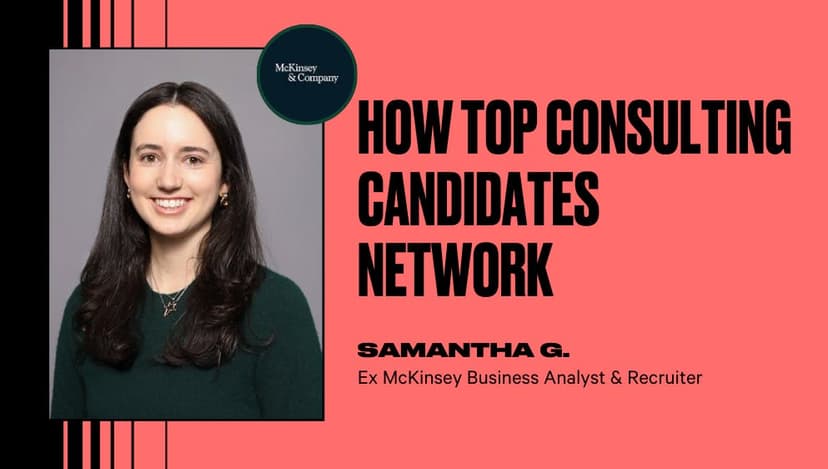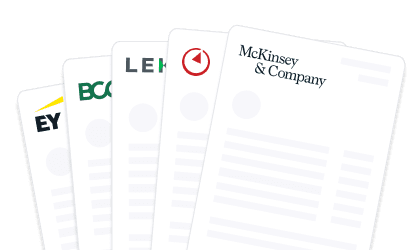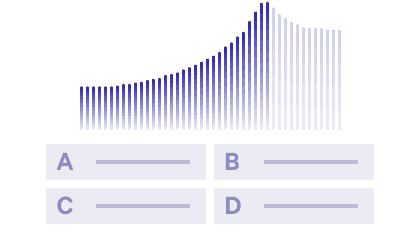A Comprehensive Guide to McKinsey Case Interview Preparation
Looking to ace your McKinsey case interview? Our comprehensive guide has got you covered! From understanding the interview process to mastering case frameworks, we provide expert tips and strategies to help you prepare and succeed.
Posted June 13, 2025

Join a free event
Learn from top coaches and industry experts in live, interactive sessions you can join for free.
Table of Contents
Preparing for a McKinsey case interview can be a daunting task, especially if you’re not sure where to start. As one of the most prestigious consulting firms in the world, McKinsey & Company is known for its rigorous interview process, which involves a unique problem-solving approach and an emphasis on communication skills. In this comprehensive guide, we’ll take you through all the steps you need to take to prepare for the McKinsey case interview and give you the best chance of success.
Understanding the McKinsey Case Interview Process
The McKinsey case interview is a simulation of a real-world business problem. The interviewer will present you with a hypothetical scenario based on a real-life company, and ask you to analyze the situation, identify the key issues, and provide a recommendation for how the company should proceed. The objective of the case interview is to test your analytical and problem-solving skills, as well as your ability to communicate your ideas in a clear and concise manner.
It is important to note that the McKinsey case interview is not just about getting the right answer. The interviewer is also evaluating your thought process, creativity, and ability to think on your feet. Therefore, it is important to approach the case interview with an open mind and be willing to explore different solutions and perspectives.
One way to prepare for the McKinsey case interview is to practice with case studies. There are many resources available online, including sample cases and practice questions. It is also helpful to work with a partner or mentor who can provide feedback on your approach and communication skills.
Key Skills Required for a Successful McKinsey Case Interview
To succeed in a McKinsey case interview, you need to possess several key skills. First and foremost, you need to be able to think critically and strategically. You must also be able to communicate your ideas in a clear and concise manner, and be comfortable with numbers and data analysis. Additionally, you need to demonstrate the ability to manage your time effectively, remain calm under pressure, and work collaboratively with others.
Another important skill to have for a successful McKinsey case interview is the ability to ask insightful questions. You should be able to identify the key issues and ask relevant questions that will help you understand the problem at hand. This will also demonstrate your curiosity and eagerness to learn.
Lastly, it is important to have a strong business acumen. You should have a good understanding of the industry and market trends, as well as the company's goals and objectives. This will help you provide relevant and practical solutions to the case problem, and showcase your ability to think like a business leader.
Tips to Ace McKinsey Case Interview
Preparation is key when it comes to acing a McKinsey case interview. Here are some tips to help you succeed:
- Be well-prepared: Research the firm and the industry you are interested in and practice case studies.
- Be analytical: Use a structured framework to analyze the case and identify the key issues.
- Be confident: Always articulate your thoughts and recommendations with clarity and confidence.
- Be concise: Communication is key, so make sure you get to the point and avoid unnecessary information.
- Practice: Mock interviews are essential to improving your skills and getting used to the interview process.
It's also important to remember that the interviewer is not looking for a perfect solution, but rather how you approach the problem and your ability to think critically. Don't be afraid to ask clarifying questions and take time to gather your thoughts before answering. Additionally, be sure to listen actively to the interviewer and incorporate their feedback into your analysis. By following these tips and staying calm under pressure, you can increase your chances of acing the McKinsey case interview.
The Importance of Researching the Company and Industry before the Interview
Before the interview, it’s crucial to research the company and the industry you are interested in. Knowing the company's history, values, and key clients will help you demonstrate your interest and knowledge during the interview. Additionally, understanding the industry trends, challenges, and opportunities can help you come up with more insightful and strategic recommendations.
Another reason why researching the company and industry is important is that it can help you tailor your responses to the interviewer's questions. By understanding the company's goals and challenges, you can highlight your skills and experiences that align with their needs. Moreover, knowing the industry trends and best practices can help you provide relevant examples and insights that showcase your expertise.
Furthermore, researching the company and industry can also help you assess whether the company is a good fit for you. By learning about the company culture, work environment, and values, you can determine whether they align with your own goals and values. This can help you make an informed decision about whether to accept a job offer if one is extended to you.
How to Structure Your Responses in a McKinsey Case Interview
Structuring your responses is essential to communicating your ideas effectively and showing your analytical skills. Use a structured framework such as MECE (Mutually Exclusive and Collectively Exhaustive) to break down the problem and identify the key issues. Once you have identified the issues, prioritize them and develop recommendations based on your analysis. Make sure to articulate your thought process clearly and concisely throughout the exercise.
It is also important to actively listen to the interviewer and ask clarifying questions to ensure you fully understand the problem at hand. This will help you tailor your response to the specific needs of the client and demonstrate your ability to work collaboratively. Additionally, be prepared to adapt your approach if new information is presented during the interview. Flexibility and agility are highly valued qualities in a consultant and can set you apart from other candidates.
Common Mistakes to Avoid in a McKinsey Case Interview
Common mistakes that applicants make in McKinsey case interviews include:
- Jumping to conclusions without sufficient analysis.
- Overcomplicating the problem.
- Providing vague or incomplete recommendations.
- Getting frazzled under pressure.
Avoiding these pitfalls can help you stand out and demonstrate your problem-solving skills effectively.
Another common mistake that applicants make in McKinsey case interviews is not asking enough clarifying questions. It is important to fully understand the problem and the context before jumping into analysis and recommendations. Additionally, not asking questions can make it seem like you are not engaged or interested in the problem at hand. Therefore, make sure to ask thoughtful and relevant questions throughout the interview to demonstrate your curiosity and analytical skills.
Sample McKinsey Case Interview Questions and Answers
Sample McKinsey case interview questions can range from market sizing to competitive strategies. Here are some examples:
- How would you estimate the size of the global coffee market?
- How would you advise a chain of retail stores facing declining sales?
- How would you help a software company develop a new product?
- How would you advise a hospital facing budget constraints?
Answers to these questions require a structured approach, including the identification of key issues, relevant analysis, and well-supported recommendations.
It is important to note that McKinsey case interviews are not just about finding the right answer, but also about demonstrating strong problem-solving skills and the ability to communicate effectively. Candidates are expected to ask clarifying questions, think critically, and present their ideas in a clear and concise manner.
In addition to the case interview questions, candidates may also be asked behavioral questions to assess their fit with the company culture and values. These questions may focus on leadership, teamwork, and communication skills, among others.
The Role of Creativity in Solving McKinsey Case Study Problems
Creativity is just as important as analytical skills in the McKinsey case interview. You must demonstrate creativity in identifying potential solutions and making recommendations that are both innovative and realistic. Creative problem-solvers are valued in the consulting industry, as they can offer fresh ideas and perspectives that can benefit their clients.
How to Develop a Personalized Strategy for McKinsey Case Interviews
Developing a personalized strategy for McKinsey case interviews is crucial to success. Understand your strengths and weaknesses and focus on improving your weaknesses. You should also participate in mock interviews and receive feedback from others to help you improve your performance. Consider working with a coach or mentor who can provide you with additional guidance and advice.
The Benefits of Mock Interviews in Preparing for a McKinsey Case Interview
Mock interviews are an essential tool in preparing for a McKinsey case interview. Mock interviews help you get used to the format of the interview, identify your strengths and weaknesses, and receive feedback on your performance. Practicing with different problems and cases also helps you become more comfortable with the analytical process and develop creative problem-solving skills.
The Importance of Confidence and Communication Skills in a McKinsey Case Interview
Confidence and communication skills are equally essential in a McKinsey case interview as analytical skills. You must be able to articulate your ideas in a clear and concise manner and demonstrate your confidence in your recommendations. Additionally, being comfortable with numbers and data analysis is essential in communicating your insights effectively. Practice your communication skills and prepare accordingly to increase your confidence and show your potential.
How to Follow Up After a Successful McKinsey Case Interview
Following up after a successful McKinsey case interview is an essential step that many candidates overlook. Send a thank-you note or email expressing your appreciation for the opportunity, and reiterate your interest in the position. Keep the communication positive, professional, and timely. This follow-up can help set you apart from other candidates and demonstrate your attention to detail and enthusiasm for the company.
Resources for Further Practice and Preparation for a McKinsey Case Interview
There are plenty of resources available online and offline to help you prepare for a McKinsey case interview. Some of the popular ones include:
- Case in Point: Complete Case Interview Preparation by Marc P. Cosentino
- McKinsey & Company interview preparation resources
- Victor Cheng’s Case Interview Videos
Make use of these resources, attend networking events, and seek out advice from professionals in the consulting industry to help you prepare for the interview.
Preparing for a McKinsey case interview can be challenging, but with practice and preparation, you can increase your chances of success. Keep in mind the key skills required for success and practice your communication skills, and make use of the resources available to you. Follow the tips mentioned in this guide, and put in the effort required to succeed. With hard work and dedication, you can ace your McKinsey case interview and start your career in consulting.
Browse hundreds of expert coaches
Leland coaches have helped thousands of people achieve their goals. A dedicated mentor can make all the difference.



























